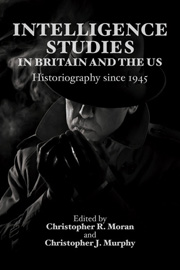Book contents
- Frontmatter
- Contents
- The Editors
- The Contributors
- List of Figures
- Preface
- Acknowledgements
- Introduction: Intelligence Studies Now and Then
- Part I AMERICAN INTELLIGENCE HISTORIOGRAPHY
- Part II BRITISH INTELLIGENCE HISTORIOGRAPHY
- 9 A Plain Tale of Pundits, Players and Professionals: The Historiography of the Great Game
- 10 No Cloaks, No Daggers: The Historiography of British Military Intelligence
- 11 The Study of Interrogation: A Focus on Torture, But What About the Intelligence?
- 12 Whitehall, Intelligence and Official History: Editing SOE in France
- 13 A Tale of Torture? Alexander Scotland, The London Cage and Post-War British Secrecy
- 14 1968 – ‘A Year to Remember’ for the Study of British Intelligence?
- 15 Their Trade is Treachery: A Retrospective
- 16 Intelligence and ‘Official History’
- Index
15 - Their Trade is Treachery: A Retrospective
from Part II - BRITISH INTELLIGENCE HISTORIOGRAPHY
Published online by Cambridge University Press: 05 October 2013
- Frontmatter
- Contents
- The Editors
- The Contributors
- List of Figures
- Preface
- Acknowledgements
- Introduction: Intelligence Studies Now and Then
- Part I AMERICAN INTELLIGENCE HISTORIOGRAPHY
- Part II BRITISH INTELLIGENCE HISTORIOGRAPHY
- 9 A Plain Tale of Pundits, Players and Professionals: The Historiography of the Great Game
- 10 No Cloaks, No Daggers: The Historiography of British Military Intelligence
- 11 The Study of Interrogation: A Focus on Torture, But What About the Intelligence?
- 12 Whitehall, Intelligence and Official History: Editing SOE in France
- 13 A Tale of Torture? Alexander Scotland, The London Cage and Post-War British Secrecy
- 14 1968 – ‘A Year to Remember’ for the Study of British Intelligence?
- 15 Their Trade is Treachery: A Retrospective
- 16 Intelligence and ‘Official History’
- Index
Summary
After I retired from daily Fleet Street journalism in 1979, aged sixty-five, I moved home to the quiet West Berkshire village of Kintbury, where I intended to make the most of the nearby trout-fishing and pheasant-shooting facilities. Though I expected to continue as a novelist, with occasional journalism, I thought my days of writing about defence issues and espionage, in particular, were over. Then on the summery afternoon of 4 September 1980, an unexpected telephone call plunged me back into the mainstream of treachery, politics and intrigue with national and international consequences, involving some of the most senior politicians, civil servants and legal authorities in the land. At the age of ninety-eight, those consequences are still dominating my investigative efforts.
The call was from Lord (Victor) Rothschild, whom I had known for thirteen years, speaking from his home in Cambridge. He said that he was being visited by a friend from overseas, who wished to meet me. When I balked at the distance, he offered to send a chauffeured car from London to take me to his house for dinner. Then, he outlined, I would be driven back home the following morning.
I knew that Rothschild had served in the MI5 throughout World War II with distinction. He was, by both nature and training, a devious person. Indeed, he was so further warped by his secret service that it was so difficult to get a straight answer from him, so much so that his biographer and close friend, Kenneth Rose, called his book Elusive Rothschild.
- Type
- Chapter
- Information
- Intelligence Studies in Britain and the USHistoriography since 1945, pp. 281 - 288Publisher: Edinburgh University PressPrint publication year: 2013



